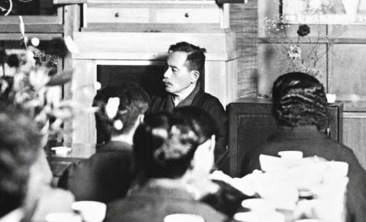
CASE #29: Makiguchi Refuses to Lecture
Once Tsunesaburo Makiguchi was asked whether it might be better to have formal lectures instead of a discussion format. “No, it wouldn’t,” Makiguchi replied. “At a lecture, listeners inevitably feel uninvolved.”
BACKGROUND:
Tsunesaburo Makiguchi: The first president of the Japanese Buddhist lay organization Soka Kyoiku Gakkai (“Value Creation Society”), which subsequently became the Soka Gakkai International. During World War II he was incarcerated by the Japanese military government for his refusal to consolidate with other Buddhist sects behind the national war effort. He died in prison of malnutrition in 1944.
Discussion format: The Japanese term zadankai refers to monthly group discussions, usually held in members’ homes. At such meetings, rather than listening to the Buddhist teachings of a master as one might do at a temple, participants share their experiences with one another, with an emphasis on recounting how they used Buddhist teachings in real-life situations.
NOTE: Egalitarian discussions were an important part of Tokyo intellectual life during the early years of the 20th century. Makiguchi’s innovation was to hold religious meetings in that format, making each member responsible for manifesting the teaching in his or her life.
COMMENTARY:
Makiguchi was a dynamic spiritual leader. Probably everyone wanted to hear what he had to say. Why wouldn’t he take the lectern? The key is involvement.
When it comes to eco-spirituality and the kinds of environmental action it inspires, are we better served by a pulpit-to-pew, platform-to-cushion kind of approach? Probably not. Every major reform movement in American history began with a discussion group. Find an exception if you can.
VERSE:
One full-throated trill
And suddenly the forest
Is filled with dharma.
Try if you must to locate
A leader among the frogs.
♦
Thank you for subscribing to Tricycle! As a nonprofit, we depend on readers like you to keep Buddhist teachings and practices widely available.